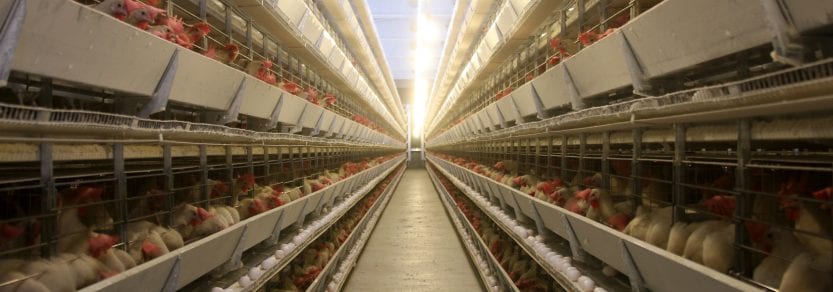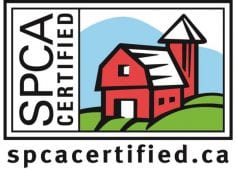Over the past five decades, global demand for animal-based foods has more than tripled to feed a continuously growing population. To satisfy this demand, pressure has been put on farmers to produce more and more meat, eggs and dairy products. As a result, the farm industry has transitioned toward intensive farming systems.

These intensive systems require huge amounts of resources, put pressure on the environment and contribute to a number of problems affecting human health and farm animal welfare. If we continue along the same path, global animal production is predicted to nearly double from around 70 billion animals today to 120 billion animals by 2050. Our planet will not be able to sustain this.
So how can we help reverse these changes? One option is to make changes to our diet in a way that would take some of the pressure off farmers. We can support them in switching to farming methods that are better for animal welfare and the environment.
Consider changing your eating habits
 While the BC SPCA is not a vegan organization, we understand the benefits of reducing the amount of animal-based foods we eat and making humane choices when we do eat them. Research suggests:
While the BC SPCA is not a vegan organization, we understand the benefits of reducing the amount of animal-based foods we eat and making humane choices when we do eat them. Research suggests:
- It can have positive effects on our health, particularly on our risk of heart disease, certain types of cancers, stroke, diabetes and other serious illnesses.
- It can be good for the environment and reduce our carbon footprint. Globally, farm animal production is responsible for about 15 per cent of human-caused greenhouse gas emissions.
- Choosing humanely-raised foods makes big improvements to the lives of farm animals. Farmers win too; over one-third (35 per cent) of Canadians are willing to pay more for humanely-raised products.
A growing number of Canadians are choosing to reduce their reliance on animal-based foods. In fact, vegetarians and vegans account for nearly 10 per cent of Canada’s population, and nearly half (43 per cent) of Canadians are actively trying to eat more plant-based foods.
Of course, reducing the amount of meat, eggs and dairy we eat does not mean we have to completely remove them from our diets.
Everything in moderation
Choose quality over quantity. Animal-based foods can be an important part of a healthy diet, but it’s crucial that when we do eat these foods, we choose products that are raised to a higher set of animal welfare standards.
At the BC SPCA, this means that farm animals have been raised according to strict SPCA Certified standards.
The SPCA Certified difference
Choosing SPCA Certified products means  you are advocating for a better life for farm animals. SPCA Certified animals are free from confinement housing (e.g. cages for hens, gestation stalls for pregnant pigs) and are instead raised in spacious environments designed to promote comfort, positive natural behaviours and healthy social interactions. They are also provided a healthy diet, are treated with respect, and receive immediate medical attention if they become sick or injured.
you are advocating for a better life for farm animals. SPCA Certified animals are free from confinement housing (e.g. cages for hens, gestation stalls for pregnant pigs) and are instead raised in spacious environments designed to promote comfort, positive natural behaviours and healthy social interactions. They are also provided a healthy diet, are treated with respect, and receive immediate medical attention if they become sick or injured.
This matters because our world is inhabited by many animals, and we share a common ecosystem of air, earth and water. With nearly 700 million animals farmed for food in Canada every year, we have a responsibility to help build them a better future.
 SPCA Certified products also have a wide range of nutritional benefits. Compared to intensively-raised animals, products from humanely-raised animals contain less fat, fewer calories, and have higher levels of essential nutrients. For example, research suggests that:
SPCA Certified products also have a wide range of nutritional benefits. Compared to intensively-raised animals, products from humanely-raised animals contain less fat, fewer calories, and have higher levels of essential nutrients. For example, research suggests that:
- Eggs from pasture-raised hens have significantly higher levels of vitamin E and omega-3 fatty acids, which are linked to reductions in heart disease, improved brain development and function, and better immune system function.
- Humanely-raised beef contains less fat and has higher levels of omega-3 fatty acids.
- Milk from dairy cattle fed a natural grass diet has higher levels of conjugated linoleic acids (CLA), which may play a role in cancer prevention.
As an added benefit, the SPCA Certified program prohibits the use of antibiotics on healthy animals to speed up their growth, a practice that undermines public health. This ensures that only the sick and injured animals who need antibiotics to regain their health receive treatment.
Take action
We cast our vote for the kind of lives farm animals will have each time we take out our wallet at the grocery store, restaurant or farmers’ market. Ensure you support only hard-working farmers who have a passion for improving the lives of the animals they raise.
- Choose SPCA Certified. To find SPCA Certified farms near you, check out our interactive map.
- If you can’t find SPCA Certified foods in your area, use our quick guide to humane food labels to learn what labels you can look for instead.
- Encourage your local supermarkets to stock higher welfare foods.
By choosing more humane meat, eggs and dairy products in combination with a mix of healthy veggie alternatives, together we can make big improvements to the lives of farm animals, our health and the planet we all share.
FarmSense e-newsletter
Are you passionate about farm animal issues? Use the form below to subscribe to our FarmSense e-newsletter. Four times per year you will receive news and information on what the BC SPCA is doing to help further farm animal welfare in Canada!
The BC SPCA uses your personal information to update you on our work for animals as well as for advertising and analytics purposes. More information on uses and how to opt-out can be found in our Privacy Policy.
